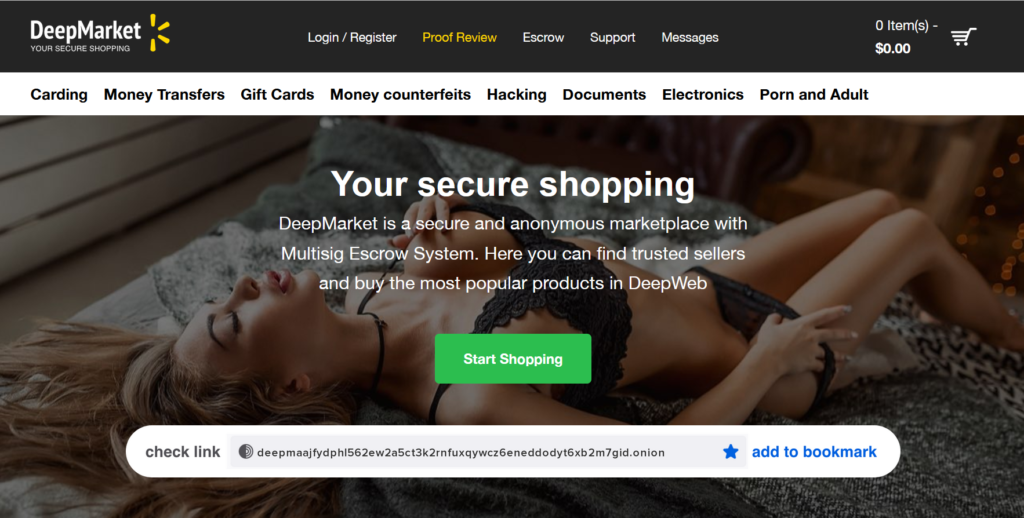Table of Contents
ToggleDeepMarket – TOR Scam Report (1)
Onion Link: http://deepmaajfydphl562ew2a5ct3k2rnfuxqywcz6eneddodyt6xb2m7gid.onion
Scam Report Date: 2023/07/27
Client Scam Report Breakdown
Original Report Summary:
The client initially shared their experience in this brief statement: “They just scammed me, I never received my product. They are very very nice people before your purchase, after that they will not ask you never again.” This report highlights a common issue found across many online marketplaces, where buyers are deceived into believing they are dealing with reputable vendors, only to be left empty-handed after making a payment.
Analysis and Breakdown
- “They just scammed me” – This part of the statement refers to the essence of the buyer’s complaint: they were defrauded by the vendor. In the context of online marketplaces, a scam occurs when the buyer sends payment but receives either a counterfeit product or, in this case, no product at all. This is a fundamental violation of trust in marketplaces, particularly those using multisig escrow systems, like DeepMarket. The multisig escrow system is designed to protect both the buyer and seller by holding funds in a secure wallet until both parties confirm a successful transaction. However, in this case, the escrow may have been manipulated or bypassed, contributing to the scam.
- “I never received my product” – This complaint emphasizes the vendor’s failure to deliver the purchased item. Non-delivery is a frequent issue in fraudulent transactions. In marketplaces like DeepMarket, this typically involves vendors posting listings, accepting payment, and then failing to follow through with shipping or delivering the promised item. Fraudulent vendors exploit anonymity provided by the dark web to evade accountability, making it difficult for buyers to pursue recourse. In the scam report, this mention serves as the primary grievance that prompted the client’s dissatisfaction.
- “They are very very nice people before your purchase” – Here, the buyer describes how the vendor appeared trustworthy and responsive before the transaction. This practice of creating a false sense of security through positive communication is a common social engineering tactic used by fraudsters. By engaging with the buyer and providing excellent pre-sale customer service, the vendor builds a sense of reliability and professionalism. This can mislead potential customers into believing they are making a secure purchase. However, this friendliness quickly fades once the payment is processed.
- “After that they will not ask you never again” – In this final part of the report, the buyer points out the vendor’s abrupt communication breakdown after the payment was completed. The phrase refers to the fact that after money changes hands, scam vendors often ghost or stop responding entirely, leaving the buyer unable to track the status of their order or resolve any issues. This lack of post-sale support reflects a breach of DeepMarket’s claim of offering 24/7 customer support, which supposedly protects buyers against such incidents.
Terminology and Definitions
- Multisig Escrow System: A security feature used in many online marketplaces, particularly on the dark web, to ensure that funds are only released once both the buyer and seller confirm the transaction. Fraudsters sometimes exploit loopholes in these systems or bypass them altogether.
- Scam: A fraudulent act or scheme in which someone gains financially by deceiving another party.
- Anonymity: The practice of hiding one’s identity to evade detection or accountability, which is commonly used by vendors on dark web marketplaces.
- Social Engineering: The use of psychological manipulation to trick users into making security mistakes or giving away sensitive information.
- Ghosting: A tactic used by scammers to sever all communication after receiving payment, leaving the buyer without the ability to resolve issues or recover funds.
Conclusion
The report underscores the manipulative tactics employed by scammers on DeepMarket, where fraudsters exploit a marketplace’s reputation and systems to conduct their schemes. In this case, the vendor created a false sense of trust through pre-purchase communication, only to disappear once the payment was made. This breakdown in trust is particularly damaging for platforms like DeepMarket, which promotes itself as a safe, anonymous marketplace with buyer protection. For buyers, understanding these signs of fraud can be crucial in navigating such environments, and for marketplaces, stronger enforcement of buyer protection measures is needed to prevent these incidents.






